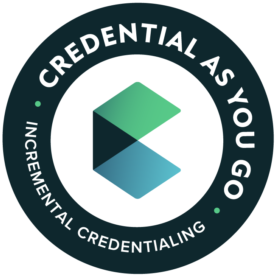One barrier facing learners who seek support is the very fact that so many offices are involved in providing these services or connecting students to them. The following institutions are working to break down these silos and provide streamlined delivery of holistic services:
Improving Access to Community Resources
Advisors Connecting Learners to Holistic Supports
Encouraging Tutoring and Mentoring
Black Male Initiative
Veterans, Active Service Members and their Families
Justice-Involved Learners
Learners Experiencing Homelessness
National networks provide additional support to colleges looking to strengthen their approaches to implementing learner supports. Some networks are long-standing, while others provide limited-time opportunities to collaborate and address problems that learners face.

Credential As You Go has acquired three phases of funding to date. Lumina Foundation funded Phase I, resulting in the Incremental Credential Framework for testing. The Institute of Education Sciences, U.S. Department of Education funds Phase II (Grant R305T210063), which focuses on rapid prototyping of and research on incremental credentials with a national campaign. An anonymous private donor fund at the Program on Skills, Credentials & Workforce Policy at George Washington University funds the development of the prototype Learn and Work Ecosystem Library. Walmart funds Phase III, which focuses on systems change for expansion and sustainability of incremental credentials. The opinions expressed are those of the authors and do not represent views of Lumina Foundation, Institute of Education Sciences, the U.S. Department of Education, Walmart, or George Washington University.